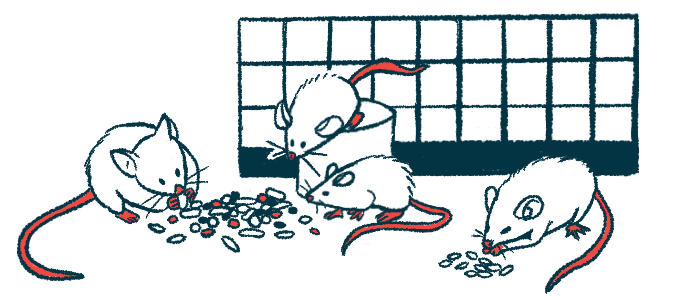CBD Fails to Reduce Seizures in Infantile Batten Mouse Model

Six months of treatment with cannabidiol (CBD) reduced brain inflammation in a mouse model of infantile Batten disease, but did not affect the frequency of seizures or the survival of nerve cells, a new study reports.
Given the severe symptoms that typically characterize this subtype of Batten disease, the scientists noted that the dosage used in this research may simply have not been enough.
“It is possible that an even higher dose is required to affect seizures in the context of such profound disease,” the team wrote.
The study, “Effects of chronic cannabidiol in a mouse model of naturally occurring neuroinflammation, neurodegeneration, and spontaneous seizures,” was published in Scientific Reports.
CBD is a molecule that is found naturally in the cannabis plant. It is not psychoactive — meaning it doesn’t induce a “high” associated with other marijuana compounds — but it has many other effects on the body, including substantial anti-inflammatory properties.
Cannabidiol also has shown anti-seizure activity in some disease models in which seizures are induced with specific stimuli (e.g., a seizure-inducing drug).
Now, an international team led by scientists at Washington University School of Medicine, in St. Louis, Missouri, examined the effects of long-term CBD treatment in a mouse model of infantile Batten disease (also called CLN1 disease).
Testing CBD in an infantile Batten mouse model
“The goal of this research is to evaluate which aspects of CLN1 disease (neuroimmune response, neurodegeneration, neuroinflammation, and seizures) chronic CBD can impact, and how it may influence disease outcome,” the team wrote. “We provide empirical evidence of how CBD alone affects these disease characteristics, and add unique data to the relative dearth of research examining how chronic administration of this cannabinoid affects a mouse model of naturally-occurring seizures.”
CBD exerts its biological effects by binding to specific protein receptors on the body’s cells. The researchers first assessed whether these receptors were present in the brains of mice with infantile Batten disease. The receptors were found to be present at levels comparable to those in wild-type (untreated) mice even at advanced disease stages.
The team then tested the effects of six months of treatment with CBD, given to the mice in flavored gelatin cubes. Results showed that CBD-treated mice experienced similar seizure activity as untreated mice.
Analyses of the mice’s brains indicated that CBD treatment reduced the activity of certain glial cells (microglia and astrocytes) in particular brain regions. These cells help modulate inflammation in the brain, and the specific markers the researchers looked at “are commonly used as a proxy for a neuroimmune or neuroinflammatory response,” the scientists said.
There were no changes in levels of pro- or anti-inflammatory signaling molecules in the brains of CBD-treated mice — though the researchers noted that whole-brain analyses of signaling compounds might have missed differences within particular brain regions.
“Future studies will be required to determine the effects of CBD treatment at various time points to determine the temporal nature of the reductions in astrogliosis and microglial activation,” the researchers wrote.
Analyses of brain tissue also indicated that CBD treatment did not affect the survival of neurons (nerve cells) or slow atrophy in the cortex, which is the outermost brain region.
“Although there appeared to be a slight increase in cortical thickness with CBD treatment, this did not reach statistical significance. In addition, there was no significant change in neuron counts in either the thalamus [a brain region] or the cortex following chronic CBD treatment,” the researchers wrote.
Despite the apparent lack of effect on seizure activity in this study, the researchers noted that there have been anecdotal reports of cannabis products helping ease seizure activity for people with infantile Batten.
The scientists stressed that they were only testing one molecule; it is possible that other compounds in cannabis may affect seizures, or there may be interactions between cannabis compounds and existing treatments used to control seizures.
It’s also possible that other dosing regimens of CBD might have an effect on seizures — or that cannabidiol may be useful as an add-on to other treatments, the team said.
“Alternatively, a lower dose may produce more desirable results, especially should it be used in combination with other anti-seizure drugs,” they wrote.
These initial findings emphasize a need for more research to explore these questions relative to infantile Batten disease.
“It has been shown previously that CBD protects against seizures in multiple mouse models of induced epilepsy,” the researchers wrote.







